Data engineering is the backbone of modern analytics, but building a robust in-house team can be prohibitively expensive and slow. Outsourcing offers a strategic alternative: expert capabilities, scalable teams, and quality without the fixed overhead.
According to Statista, the global IT outsourcing market was valued at around $317 billion in 2021 and is projected to reach $591 billion by 2025, with data-driven and analytics services as key growth segments. Companies turning to outsourced services benefit from access to global talent, specialized data engineering solutions, and lower total cost of ownership.
From BNXT’s perspective, this surge isn’t just about scale - it’s about intelligence. We’ve seen enterprises evolve from manual data handling to AI-driven ETL and data observability frameworks, ensuring cleaner pipelines, faster insights, and stronger compliance. By adopting specialized outsourcing models, organizations are shifting from static, in-house teams to agile, cloud-powered ecosystems that deliver measurable ROI and continuous optimization.
At BNXT, we’ve seen clients transform their data pipelines using outsourcing, transitioning from heavy CapEx investments to efficient OpEx models - while maintaining high data quality metrics and compliance.
✅ What you’ll learn in this article:
- The meaning and components of outsourced data engineering
- Why companies choose it (cost, scalability, insight speed)
- How to balance cost savings with uncompromised quality
- Risks to watch and how to pick the right partner
👉 See how BNXT combines custom web development, custom mobile app development, and AWS cloud migration experts to support data-driven platforms.
What Is Outsourced Data Engineering?
Outsourced data engineering is the practice of delegating critical tasks like building data pipelines, managing storage, and ensuring data quality to an external outsourcing company. Instead of shouldering the cost of recruiting and training a team of data engineers, businesses leverage outsourcing services that provide specialized expertise and modern data engineering solutions.
This approach is increasingly popular within IT outsourcing services because it eliminates heavy CapEx investments and shifts costs to predictable OpEx models. For enterprises, outsourcing means faster access to skilled professionals, scalable data engineering platforms, and proven delivery models.
According to IDC, global spending on business outsourcing services - including data engineering - is expected to grow significantly through 2025, driven by the demand for real-time analytics and cloud-native platforms.
Learn how BNXT helps enterprises modernize applications through Enterprise Web Development Services.
Key Functions of Data Engineering Services (ETL, Pipelines, Modeling)
Outsourced data engineering services typically cover the entire lifecycle of data management:
AI-Driven ETL (Extract, Transform, Load): Modern outsourcing companies use AI-driven ETL and data observability frameworks to automate data ingestion, cleaning, and transformation. This ensures higher accuracy, faster processing, and real-time error detection.
- ETL (Extract, Transform, Load): Moving raw data from multiple systems, cleaning it, and preparing it for analytics.
- Data Pipelines: Automating data flow across applications, cloud services, and analytics engines - critical for real-time decision-making.
- Data Modeling: Structuring information into accessible formats for BI dashboards, machine learning, and predictive analytics.
- Integration Consulting: Many outsourcing partners provide data integration consulting to unify siloed systems into one streamlined platform.
These services allow enterprises to offload complexity and focus on using data for growth instead of maintaining infrastructure.
In-House vs Outsourced Data Engineering - Key Differences
The debate between in-house and outsourced services often comes down to cost, scalability, and expertise.
- In-House Data Engineering: Requires building teams of skilled data engineers, setting up infrastructure, and investing in ongoing training. While it provides more control, it often results in high costs and longer timelines.
- Outsourced Data Engineering: Offers scalable solutions through outsourcing companies or managed services. Costs are predictable, projects move faster, and enterprises gain access to global expertise without long onboarding cycles.
According to Deloitte’s Global Outsourcing Survey, 70% of organizations cite cost reduction as the top reason for outsourcing, while 62% emphasize access to specialized talent. These findings highlight why outsourced IT managed services have become essential for enterprises aiming to balance cost savings with quality.
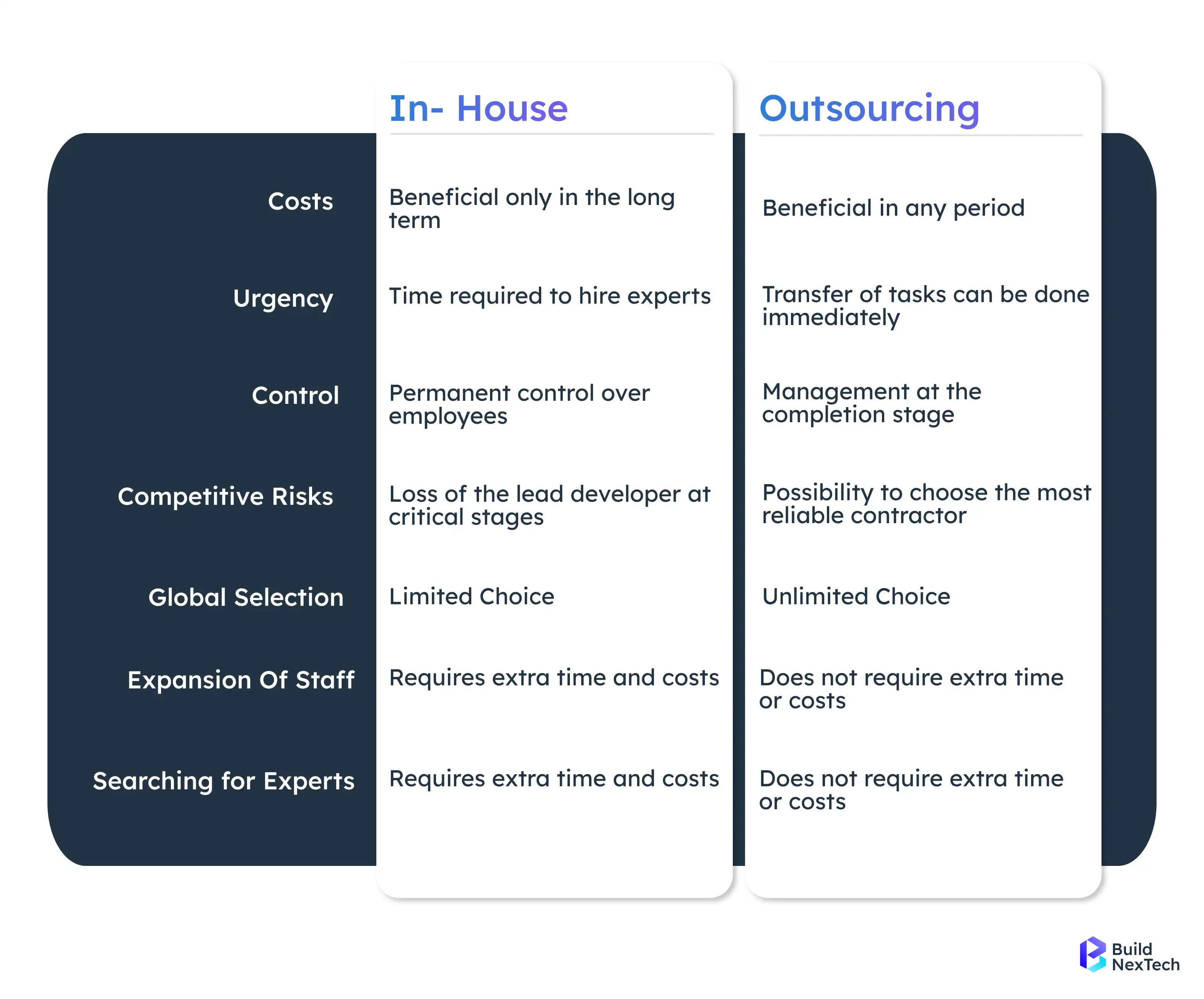
Why Businesses Outsource Data Engineering in 2025
In 2025, outsourcing is no longer a backup plan - it has become the preferred model for data-driven enterprises. The reason is simple: companies want to save costs without lowering quality. Building in-house teams requires long hiring cycles, high salaries, and constant upskilling. By contrast, outsourcing services provide immediate access to top-tier data engineers, scalable infrastructure, and advanced tools - all while keeping budgets predictable.
According to Statista, the global IT outsourcing market will reach $591 billion by 2025, and data engineering services are one of the fastest-growing categories. Organizations aren’t just saving money; they’re accelerating innovation and ensuring long-term growth.
Here’s why outsourcing is gaining momentum over in-house models:
Cost Reduction & Predictable OpEx vs CapEx
- In-house challenges: Running data engineering internally means capital-heavy spending (servers, cloud licenses, DevOps tools, ongoing training, and salaries). Even after these investments, hidden costs like staff turnover and downtime can reduce ROI.
- Outsourcing advantage: Partnering with an outsourcing company shifts costs to predictable operational expenses (OpEx) through pay-as-you-go models. Businesses only pay for the services and scale they use.
- Stat: Deloitte found that outsourcing reduces IT costs by 20 - 30%, allowing organizations to redirect funds into custom web development or enterprise web development services that directly drive customer engagement and revenue.
Access to Specialized Talent & Scalability
- In-house challenges: Hiring skilled data engineers or analytics engineers is time-consuming and expensive. The talent gap in data engineering makes it hard to build sustainable in-house teams.
- Outsourcing advantage: With outsourcing companies and agencies, businesses gain instant access to global experts in data engineering platforms, ETL pipelines, data modeling, and cloud-native architectures.
- Scalability benefit: Need to expand quickly for a new data engineering project? Outsourced services scale immediately - no waiting months to recruit, onboard, or train staff. This flexibility is critical for enterprises aiming to modernize systems or support enterprise mobile app development services without resource bottlenecks.
Faster Time-to-Insight & Quality Controls
- In-house challenges: Internal teams often take months to set up infrastructure, design data pipelines, and implement compliance measures. This delay slows down insights and competitive advantage.
- Outsourcing advantage: Outsourced partners already operate with proven data engineering roadmaps, automation-driven ETL workflows, and advanced monitoring tools. This ensures projects that would take months in-house are delivered in weeks.
- Built-in quality: Top outsourcing service providers include Service Level Agreements (SLAs) that enforce high delivery standards and reduce risk. Businesses also benefit from quality assurance processes, ensuring clean, reliable, and actionable data.
- Result: Instead of worrying about operations, enterprises can focus on innovation, enterprise web development, or collaborating with AWS cloud migration experts for end-to-end digital transformation.
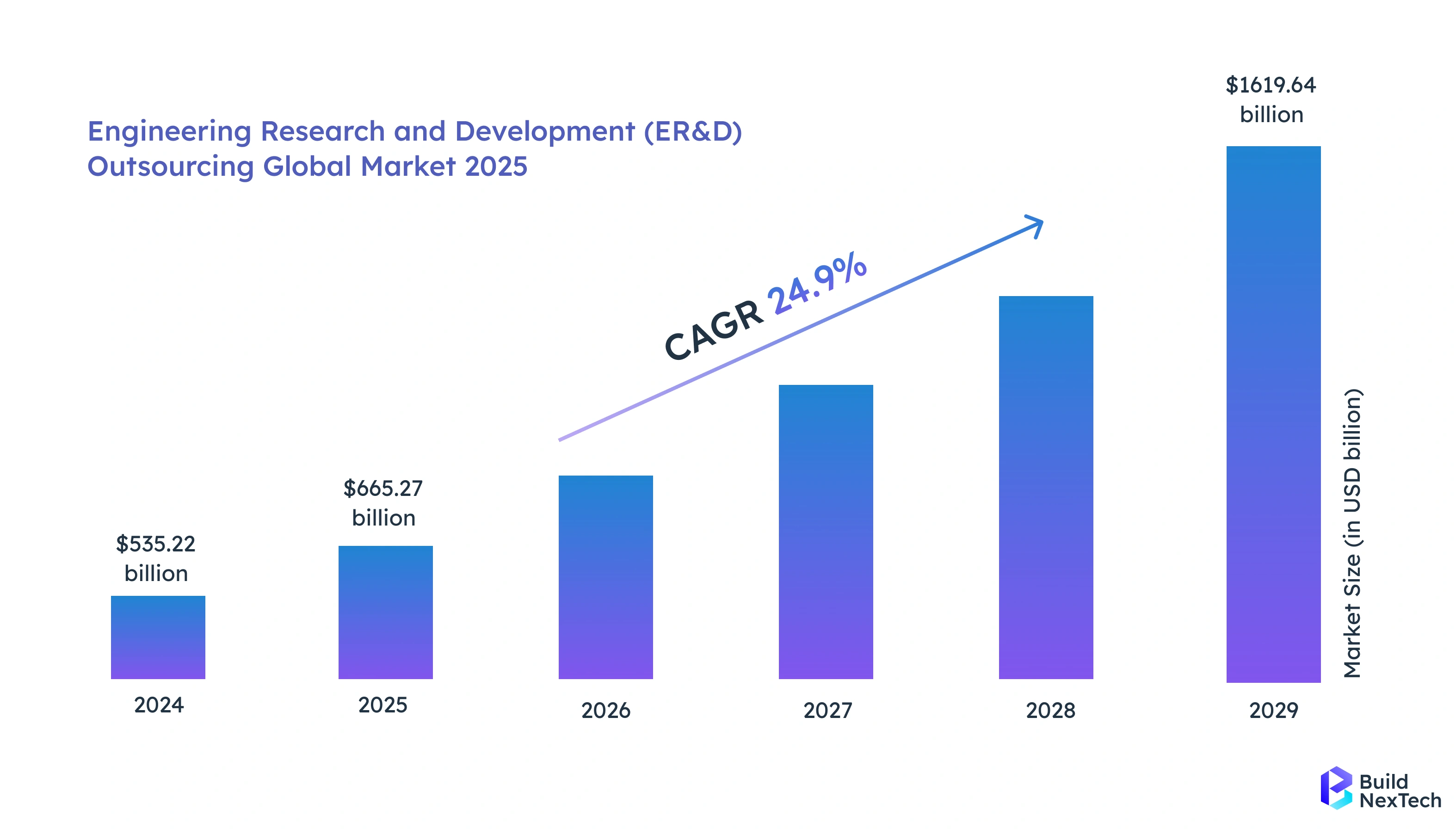
How Outsourcing Data Engineering Saves Costs Without Compromising Quality
Outsourcing data engineering isn’t just about reducing expenses - it’s about ensuring cost efficiency without sacrificing data quality. Businesses often worry that cheaper outsourced services might lead to errors or inconsistencies, but leading outsourcing companies prove otherwise by combining best practices, modern platforms, and strict SLAs.
According to Grand View Research, the IT outsourcing market is projected to grow at 8.6% CAGR through 2030, largely driven by demand for data engineering services, analytics solutions, and outsourced IT management. This shows that enterprises see outsourcing not only as a cost-saving strategy but as a quality-assured growth enabler.
Let’s break down how outsourcing strikes the right balance:
Using Best Practices, Standards & Tools
- Outsourcing services rely on proven data engineering frameworks like ETL pipelines, modeling, and orchestration tools (Airflow, dbt, Snowflake).
- Vendors implement global standards (ISO, GDPR, HIPAA) to ensure consistency, compliance, and scalability.
- Unlike in-house teams that may experiment with different methods, outsourcing partners bring predefined processes and automation, reducing errors and delays.
- Many providers also integrate with custom web development and enterprise web development services to create seamless, end-to-end digital ecosystems.
H3: Quality Assurance, Monitoring & SLAs
- Every outsourcing company provides Service Level Agreements (SLAs), which guarantee uptime, performance, and delivery timelines.
- Built-in monitoring systems ensure real-time pipeline visibility - minimizing downtime and ensuring clean, usable data.
- Independent QA teams validate outputs, ensuring that the outsourced services match or exceed in-house benchmarks.
- This guarantees that businesses benefit from both cost efficiency and data quality reliability.
Case Studies & ROI Analysis
- Many outsourcing agencies publish ROI-driven outsourcing case studies that highlight savings of 25 - 35% compared to in-house teams (McKinsey).
- For example, a financial services enterprise reduced data pipeline costs by 28% through outsourced services while achieving faster reporting cycles.
- ROI isn’t just cost-based; outsourcing accelerates time-to-market for data engineering projects and frees up IT for innovation like enterprise mobile app development services.
- Tools like a ROI calculator for outsourced IT services are often provided by vendors to showcase predictable returns.
Balancing Cost Optimization with Data Quality Metrics
- Cost optimization alone is dangerous if data quality suffers - which is why outsourcing firms emphasize data quality metrics (accuracy, completeness, timeliness, consistency).
- By applying data engineering solutions with automated quality checks, outsourcing ensures that businesses get trusted insights at scale.
- Outsourced partners align pricing models (OpEx) with strict quality KPIs, ensuring that savings do not come at the expense of accuracy or compliance.
- This balance enables long-term growth and trust in outsourced data pipelines - critical for enterprises scaling into global outsourcing models.
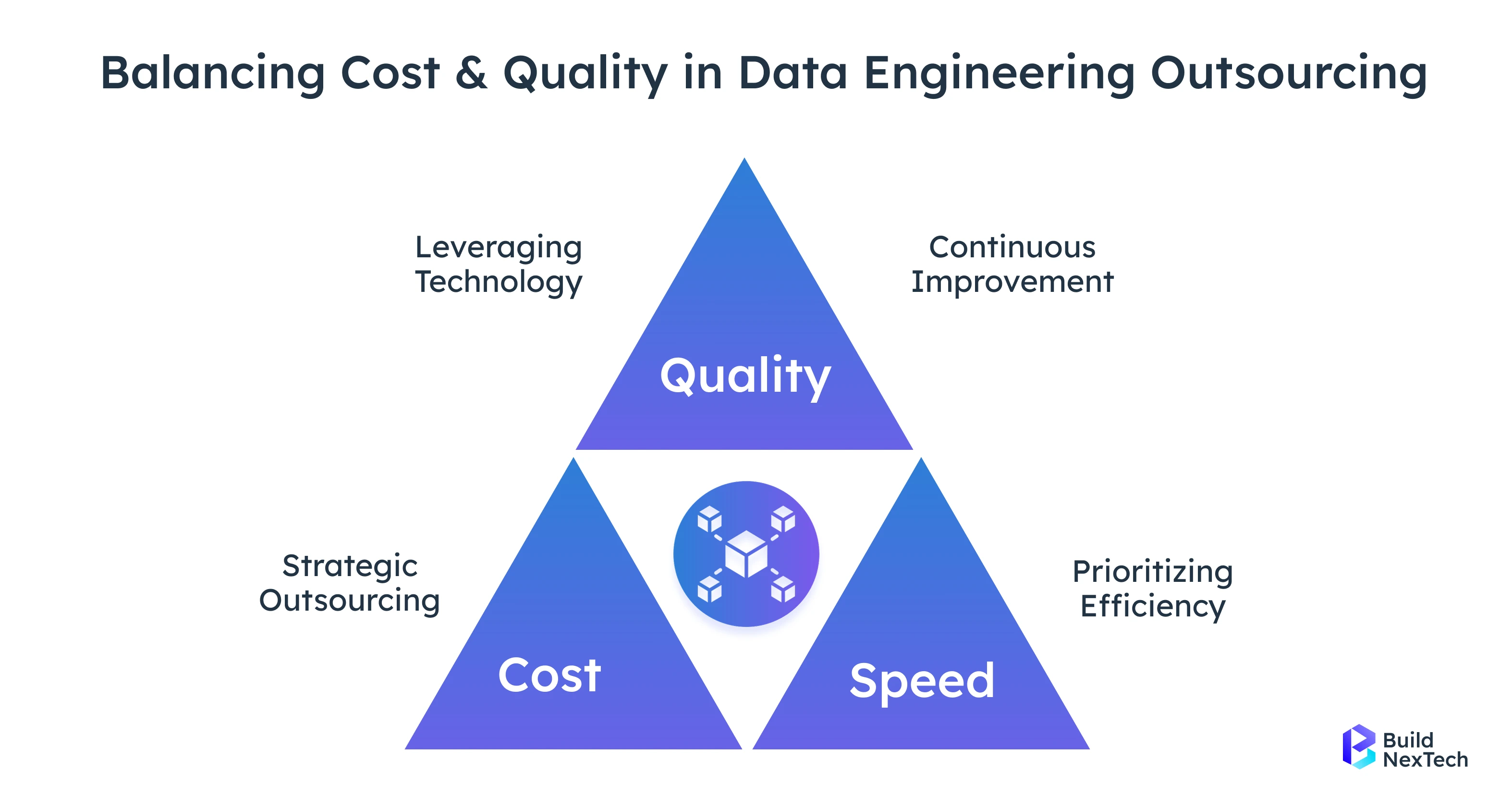
Risks & Considerations in Outsourcing Data Engineering
While outsourcing data engineering delivers cost efficiency and scalability, enterprises must also evaluate the risks and challenges. These risks don’t mean outsourcing is ineffective; instead, they highlight the need to choose the right outsourcing company, service provider, or agency with proven expertise.
According to Deloitte’s Global Outsourcing Survey, 83% of businesses that outsource say they achieve cost savings, but nearly 40% report challenges with vendor management and communication. This proves that risk is not about outsourcing itself - it’s about how well you manage your outsourcing engagement model.
Data Security & Compliance
- Outsourcing services often handle sensitive data, which raises security and compliance concerns.
- Risks include breaches, regulatory penalties (GDPR, HIPAA), or lack of internal control.
- The solution lies in partnering with outsourcing agencies that:
- Provide robust security frameworks (ISO 27001, SOC 2).
- Offer data integration consulting to align pipelines with compliance standards.
- Include SLAs that cover compliance and security audits.
- Provide robust security frameworks (ISO 27001, SOC 2).
Vendor Lock-In & Ownership of IP
- Relying too heavily on one outsourcing service provider can create vendor lock-in.
- Businesses risk losing flexibility if proprietary tools or architectures are used.
- To mitigate:
- Demand clear contracts that guarantee ownership of intellectual property (IP).
- Work with outsourcing partners using open-source data engineering platforms to ensure portability.
- Consider hybrid outsourcing engagement models to diversify risk.
- Demand clear contracts that guarantee ownership of intellectual property (IP).
Collaboration & Communication Challenges
- Outsourced teams may work offshore, creating time-zone or communication gaps.
- Risks include misaligned goals, delayed project updates, or reduced visibility into progress.
- Solutions:
- Use agile collaboration frameworks (Scrum, Kanban).
- Define transparent reporting pipelines and checkpoints.
- Choose a vendor experienced in enterprise data engineering projects with strong project management.
- Use agile collaboration frameworks (Scrum, Kanban).
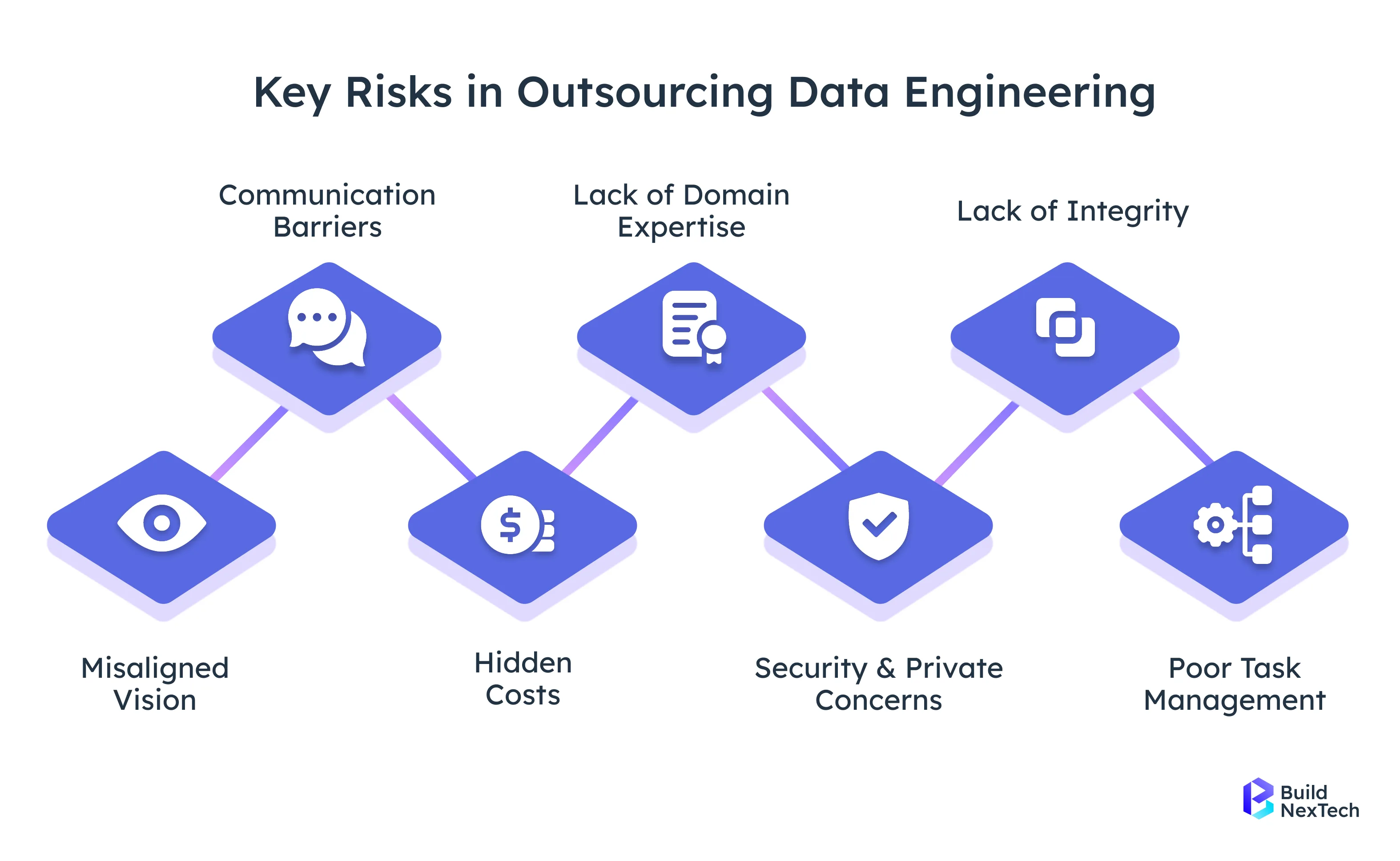
How to Choose the Right Partner for Data Engineering Outsourcing
The success of outsourcing doesn’t depend only on cost savings - it depends on choosing the right outsourcing company, agency, or service provider. A reliable partner ensures your data engineering projects align with business goals, compliance needs, and long-term scalability.
According to Gartner, enterprises that carefully evaluate outsourcing vendors achieve 30% higher ROI on outsourced IT managed services compared to companies that rush into vendor contracts.
Key Criteria for Evaluation (Expertise, Stack, Culture)
- Technical expertise → Look for outsourcing service providers with a strong track record in data engineering services, ETL pipelines, data engineering solutions, and cloud-native architectures.
- Technology stack → Ensure the vendor works with modern data engineering platforms, AI-driven analytics, and cloud integrations.
- Cultural alignment → Smooth collaboration comes from shared values, communication styles, and proven global outsourcing experience.
Questions to Ask Potential Vendors
Before committing, businesses should ask:
- What experience do you have with enterprise web development services and enterprise data engineering projects?
- Can you provide outsourcing case studies with proven ROI?
- How do you handle data security, compliance, and ownership of IP?
- What is your outsourcing engagement model - fixed-price, dedicated team, or hybrid?
- How do you ensure scalability and continuity in long-term partnerships?
Asking these questions helps identify whether a vendor is a true data engineering outsourcing partner or just a transactional service provider.
Integration & Support - Beyond Engineering
The best outsourcing agencies don’t just deliver pipelines - they become strategic partners.
- We offer custom web development and custom mobile app development alongside data engineering consulting.
- We provide post-deployment managed services and application maintenance outsourcing.
- We integrate seamlessly with in-house teams to provide hybrid support.
- Many leading firms also bring expertise from adjacent fields, such as working with AWS cloud migration experts for cloud-first strategies.
This ensures outsourcing goes beyond project delivery and supports long-term growth.
Final Thoughts & Strategic Recommendations for 2025
Outsourcing is no longer just about reducing expenses - it’s about enabling data engineering projects that combine cost efficiency, scalability, and quality assurance. In 2025, businesses that rely only on in-house teams often face rising CapEx, talent shortages, and longer delivery timelines. In contrast, those who adopt outsourced services achieve faster innovation, predictable OpEx, and stronger ROI.
The key is balance: outsourcing should not replace in-house teams completely but complement them through hybrid outsourcing engagement models. By partnering with the right outsourcing company, outsourcing service provider, or outsourcing agency, enterprises unlock benefits like:
- Better scalability → Outsourced partners scale instantly using data engineering platforms, global talent, and managed services.
- Higher ROI → Independent outsourcing case studies show outsourced teams consistently deliver measurable outcomes compared to in-house vs outsourcing IT models.
- Long-term growth → With application maintenance outsourcing, custom web development, and enterprise mobile app development services, outsourcing becomes a long-term strategy for transformation.
Businesses should also measure outsourcing through tools like a data engineer roadmap or data engineering roadmap, ensuring alignment with future goals. Training internal teams with data engineer courses while leveraging outsourced IT managed services creates the best of both worlds.
Finally, outsourcing success depends on selecting partners who go beyond software outsourcing and act as true collaborators - offering expertise in data engineering consulting, custom mobile app development, and even working alongside AWS cloud migration experts for cloud-first transformations.
People Also Ask
How much does it cost to outsource data engineering vs keeping it in-house?
In-house requires high CapEx for infrastructure, training, and hiring skilled data engineers. Outsourcing shifts this to OpEx with predictable pricing. Deloitte reports outsourcing can reduce IT costs by 20 - 30% compared to in-house models.
Can quality be maintained when outsourcing data engineering?
Yes. Reputable outsourcing companies follow strict SLAs, use proven data engineering platforms, and implement robust quality assurance practices to ensure accuracy and compliance.
What industries benefit the most from outsourcing data engineering services?
Industries with heavy data needs - such as finance, healthcare, e-commerce, and telecom benefit significantly, as outsourcing provides scalable solutions without compromising compliance or speed.
What functionalities are included in outsourced data engineering services?
Core services include ETL pipelines, data integration, data modeling, analytics engineering, maintenance, and modernization. Many vendors also offer consulting and managed services.





















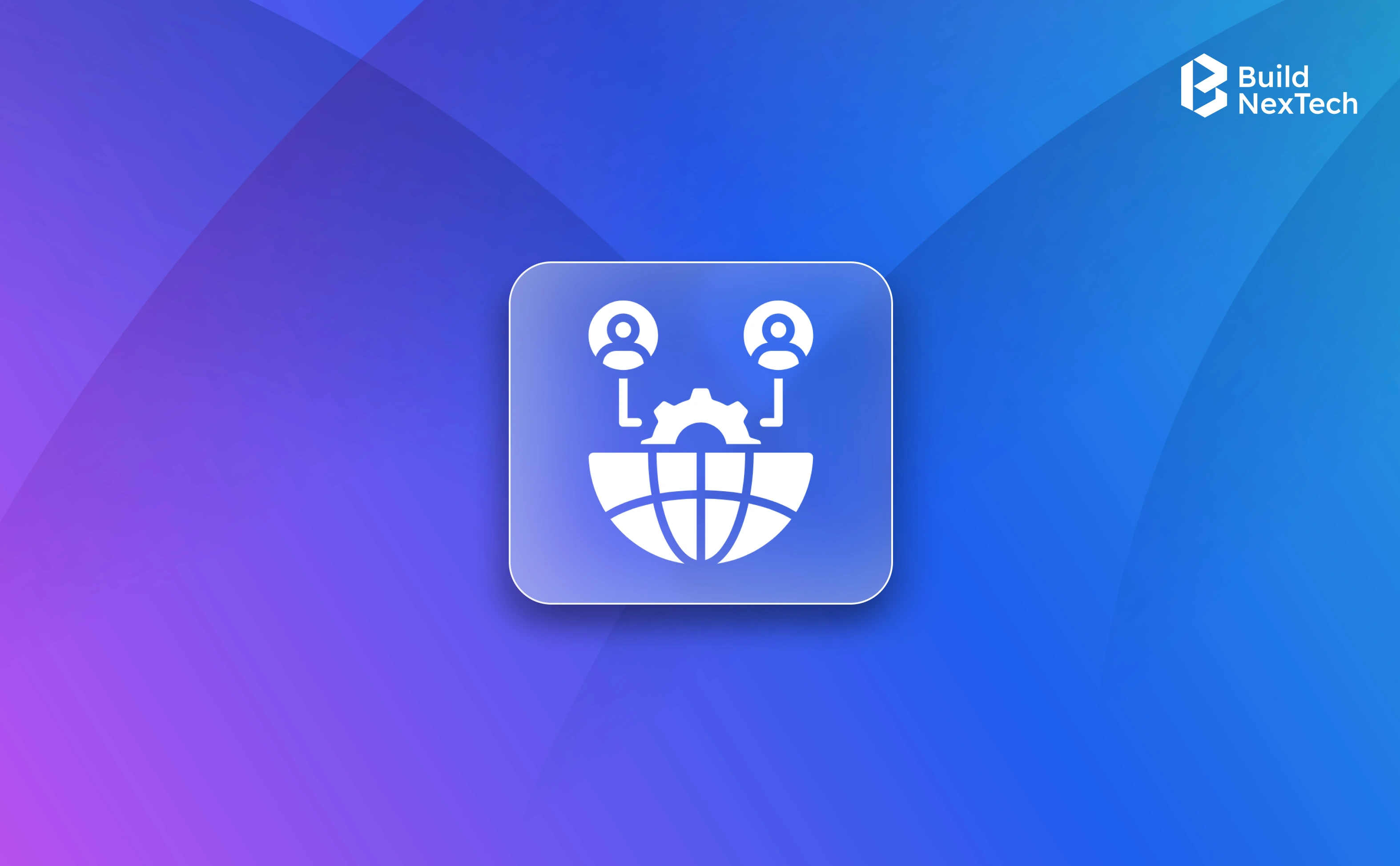





.webp)
.webp)
.webp)

